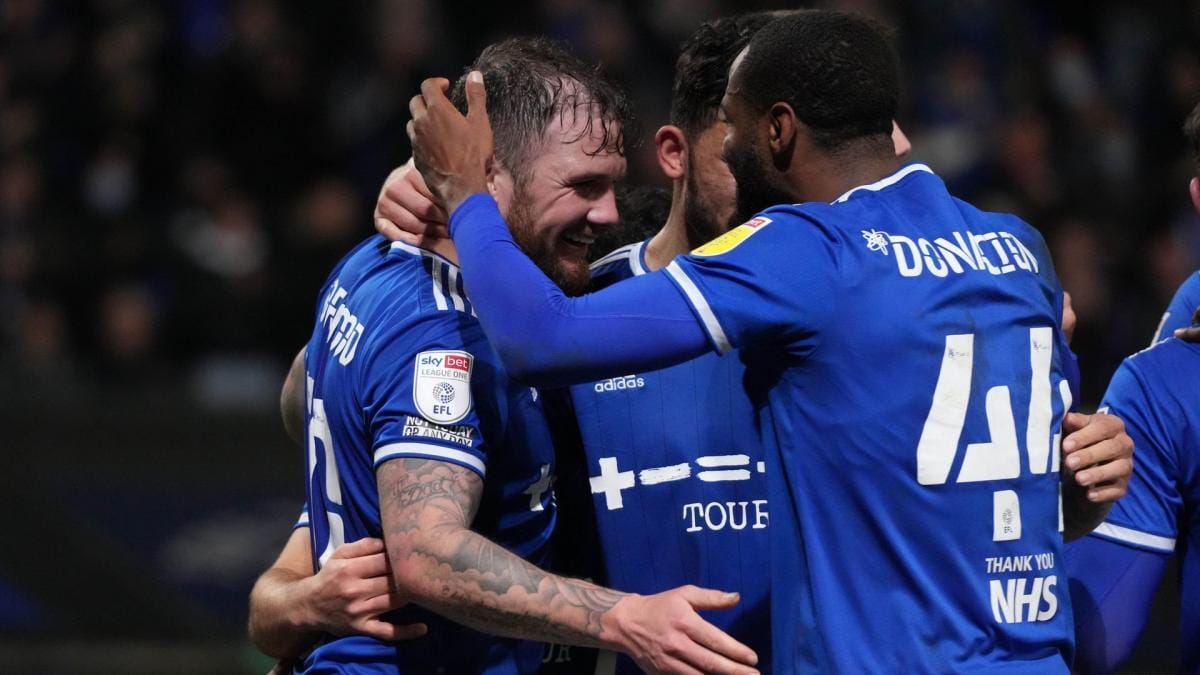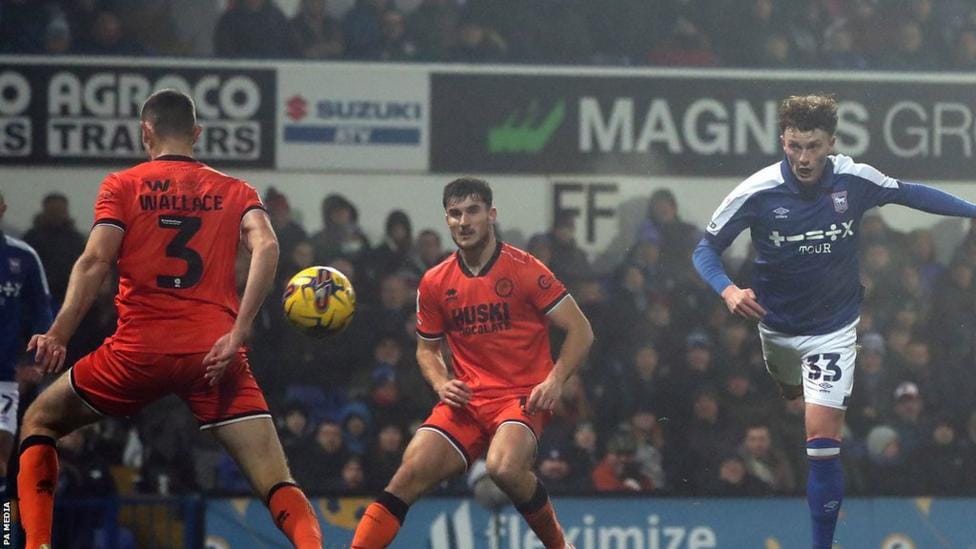- Blue and White Notes
- Posts
- Surviving Transitions
Surviving Transitions
A bit of advice for Joe Edwards from 2021
One hundred and one football matches ago, Betwixtmas Time, Ipswich fans prepared themselves for the visit of Wycombe Wanderers in Kieran McKenna’s first game. A Covid-19 postponement had robbed him of a gentle start against a Gillingham team in free fall and instead we got this sturdier challenge. Gareth Ainsworth’s Wycombe Wanderers, the Platonic Ideal of a League One team, all six-foot-plus burly lads, all long diagonals on your full back’s head, all launch and squish, all set-piece smash and grab, all shithouse and time waste.
Our new manager, zero experience in the top job and impossibly young, lined us up 3-5-2, just as interim boss John McGreal had in our previous game (a respectable draw with Sunderland). In goal, Walton was injured, so we lined up with Vaclav Hladky, widely acknowledged at the time to be a total liability. He looked smaller in those days, shrunken physically in my mind’s eye by a series of performances that were a mixture of nervy, indecisive and wretched. In December 2021 Vas couldn’t command an area, couldn’t claim a cross and could barely make a save, contriving to concede 15 times from just 33 shots that season. Perfect for the aerial bombardment that was to come. In front of him a back three of Donacien, Woolfenden and Edmundson, a shape we were gradually warming to but didn’t fully trust. To their Left, Matt Penney, a player Wycombe might have hand picked as an appealing target for Sam Vokes and Brandon Hanlan to drift towards for easy aerial duels. The rest of the midfield still looks familiar – Burns, Evans and Morsy - the forward line – Aluko, Bonne and Norwood – very much from another Ipswich world.

How does a rookie manager go about confronting these transitional moments? You’ve coached elite youth teams, where technical skills and patterns of play are everything. You’ve evidently got a core playing philosophy, that eventually you want to transmit to this group of players. It’s hard to know what route to follow from Point A, a team with ingrained bad habits and a dysfunctional playing style, to Point B, a team that embodies how you think football needs to be played.
Millwall’s Joe Edwards seemed to be grappling with this precise dilemma last night. Millwall were effective but prosaic under Gary Rowett, a combination that doesn’t leave you much room for error. Boring and rubbish will get you the sack quicker than anything in modern football. Edwards seems to have been hired according to the Ipswich playbook, where you find the best young coach currently waiting for their shot at the big chair and give them a remit to play the most modern, most exciting football currently on offer. To get there he has to evolve them from a style of football that was a bit safety first, a little bit playing the attacking percentages and rather structurally rigid, into a style that’s more free-flowing and goes through the thirds.
For an experienced manager like Neil Warnock and Mick McCarthy one assumes the answer to this conundrum is fairly straightforward. Work on defensive shape, keep it tight, keep it simple. Be hard to beat, first and foremost. You can worry about attacking patterns of play down the road, when you’re sturdier as a unit. They’ve done this a million times, they know the process and they know what is and isn’t possible.
You can of course, like Paul Cook in Spring 2020, attempt an instantaneous crash course in whatever it is you think wins football matches. Here’s my 4-2-3-1 with overlapping full backs and box midfield. We’ll be defending the half-way line with James Wilson and Toto Nsiala, whilst Teddy Bishop and Andre Dozzell dominate the midfield, thank you very much. If it doesn’t work, you can always set them double training sessions to magically up their athleticism seven months into the season.

Last night, Edwards appeared to have gone more down the Cook route. We had the spectacle of Bart Bialkowski, nobody’s idea of a sweeper keeper playmaker, being forced to play out. The looming silhouette of a sprinting George Hirst would unsettle far more accomplished ballplayers than he. The back three of Wallace, Hutchinson and Harding looked no more comfortable with their respective shadows, Burns, Chaplin and Broadhead, and regularly found themselves working the ball in scruffy triangles before inevitably their options ran out and they disposed of the ball in whatever manner they could. At the other end Bradshaw, Flemming and Emakhu all took it in turns to engage in a solitary press before turning, exasperated, to team-mates who had missed whatever was supposed to be triggering their collective charge. The sum total of this mess was probably the weakest opposition performance we have seen so far at Portman Road.
There is a sense in which this is a good time for Millwall to roll the dice in this way. The weakness of the bottom four makes relegation a very slim possibility and they’ve had a bad enough start to make promotion a wild long shot. There’s not much lost by using the rest of this season to work out a viable new system. But I do wonder if, in reality, football works like that. We won that first game under McKenna pretty narrowly and we won it in a manner which, with hindsight, was not very McKennaish. Out-shot 12 to 7 in a home game, we spent a fair proportion of the game doggedly defending our penalty area and looking for opportunities on the break. For long periods it felt like a game where we’d either buckle to pressure or finally kill them off in transition, rather than the attacking setup we’re accustomed to. With a little more composure Brandon Hanlan might have earned Wycombe a share of the points. The whole performance was more dogged and more rigid than we would come to expect.
It was also absolutely vital to McKenna. Our position in 2021 was a purgatory not dissimilar to Millwall’s situation now, but you always enter a club with zero credit in the bank. Starting with a bad run puts you in the red without even having a chance to do anything. Before you know it a bad season is giving way to a unsettled Summer and the writing is on the wall. It is trivially easy as a novice coach to start badly and never get any kind of audience with fans or players. Winning a few games early on, as you gradually improve certain aspects gets people listening to you and respecting your methods. It unlocks a modicum of patience and willingness to persist when, inevitably, you have stickier moments.
Our early performances under McKenna now look like the product of compromise, of a planned adaptation and transition. They were a calculated adaptation to the circumstances, to the players available and to things they could and couldn’t do at that time. That much more defensive team stuck around for a few months whilst we worked out whether any of Bonne, Norwood or Pigott were adequate for any of the forward roles or if Dominic Thompson was as good as Leif Davis turned out to be. We saw flashes of the kind of attacking play that turned out to be the end result of McKenna-Ball, but they were only really a fleeting presence (much of it contained within that postponed Gillingham game).
Along with Wayne Rooney, you suspect Joe Edwards is going to have to learn how to incrementally get your team on a trajectory that both unlocks some of the stylistic elements you eventually want, but also buys you time and goodwill in the immediate term. You can’t revolutionise absolutely everything straightaway and you’ll almost certainly die trying. Liam Rosenior made the case after Hull’s loss at Portman Road that Ipswich are what a team looks like after eighteen months buying into a manager’s methods. But the buy in definitely does not come for free and it doesn’t come easy.
Talking of incremental transitions, I am very much enjoying Axel Tuanzebe’s insertion into the Ipswich first team. How’s this for some shorts-still-spotless Paolo Maldini “If I have to make a tackle then I have already made a mistake” match stats:
Axel Tuanzebe v. Millwall
Touches 105
Passes into final third 5
Accurate long balls 5/11 (45%)
Tackles won 0
Clearances 2
Headed clearances 2
Interceptions 2
Defensive actions 4
Recoveries 8
Ground duels won 0/0
Aerial duels won 1/2 (50%)
Fouls committed 0
Reply